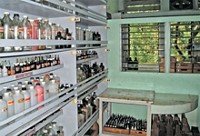Advertisement
Grab your lab coat. Let's get started
Welcome!
Welcome!
Create an account below to get 6 C&EN articles per month, receive newsletters and more - all free.
It seems this is your first time logging in online. Please enter the following information to continue.
As an ACS member you automatically get access to this site. All we need is few more details to create your reading experience.
Not you? Sign in with a different account.
Not you? Sign in with a different account.
ERROR 1
ERROR 1
ERROR 2
ERROR 2
ERROR 2
ERROR 2
ERROR 2
Password and Confirm password must match.
If you have an ACS member number, please enter it here so we can link this account to your membership. (optional)
ERROR 2
ACS values your privacy. By submitting your information, you are gaining access to C&EN and subscribing to our weekly newsletter. We use the information you provide to make your reading experience better, and we will never sell your data to third party members.
Environment
Civilian Reactors Lag In Conversion
by Jessica Morrison
February 1, 2016
| A version of this story appeared in
Volume 94, Issue 5

Programs under way since the 1970s to convert civilian research reactors worldwide from weapons-grade highly enriched uranium (HEU) fuel to low-enriched uranium (LEU) fuel could take decades more to complete, says a report from the National Academies. These reactors are used for training and producing medical isotopes. While technical and nontechnical challenges persist to update reactors that are many decades old, the report recommends immediate action to convert civilian research and test reactors still using weapons-grade uranium fuel to an intermediate fuel. Weapons-grade HEU is enriched to 90% or greater uranium-235, and LEU is enriched to less than 20% uranium-235. Converting weapons-grade HEU to a lower enriched intermediate uranium fuel with 45% or less would reduce national and international security risks for these reactors, the report says. Because more than 40% of the 74 civilian research reactors worldwide that still operate using HEU are in Russia, the report suggests that the U.S. facilitate workshops and meetings with Russian scientists to promote progress toward conversion. Universities and federal agencies manage the eight U.S. reactors yet to be converted.



Join the conversation
Contact the reporter
Submit a Letter to the Editor for publication
Engage with us on Twitter